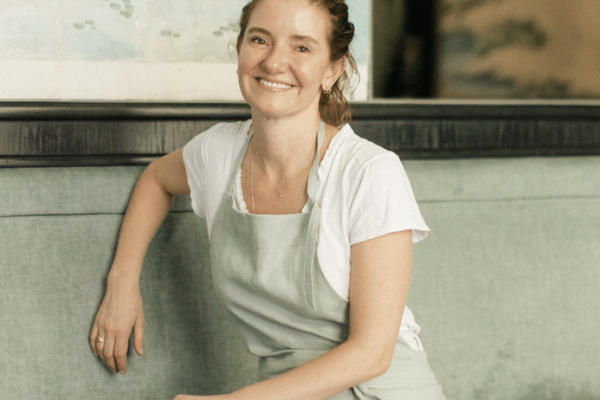Hospitality Ireland talks sustainability and storytelling with Elena Reygadas, the World's Best Female Chef
Elena Reygadas was recently named World’s Best Female Chef by the World’s 50 Best Restaurants 2023.
Reygadas divides her time between the kitchens of her five restaurants in Mexico City, ranging from the refined Rosetta to several casual concepts much loved by local diners – Lardo, Café Nin and Bella Aurora – as well as a bakery that has achieved an iconic status of its own, Panadería Rosetta.
Basing her menus on nature’s timelines, each week provides new produce to play with.
Having studied at the French Culinary Institute in New York and then working for four years at one of London’s top restaurants, Reygadas knows how tough it is to succeed in the culinary world and now champions Mexican food with a noticeable Mediterranean influence.
This article was originally published in the Autumn 2023 issue of Hospitality Ireland Magazine, in October of 2023.
What does storytelling mean to you, in the context of food?
I believe each dish, on its own, has a story to tell – from the origin of the ingredients, its connection to cultural heritage, to the creative process, etc. – but, for me, it all starts by listening to nature.
I like to think of our role as a chefs as mediums. We need to listen to ingredients, seeking to convey what they have to tell us. Mexico is a country with great biodiversity, and also with a significanethnic and cultural diversity. This is reflected in its cuisine and the stories we tell through cooking.
Have you seen a change in what the public expects from food in the last five or so years?
Absolutely. One of the things that encourages me the most about this transformation is that there is a greater awareness on how our food choices impact our health and the environment. More and more people are interested in the provenance of ingredients, sustainability, and ethical practices.
In the specific case of Mexico, I also see a growing pride in our own culture. It is increasingly clear that we have a rich and diverse gastronomic history that dialogues with multiple traditions.
What does it mean for you to take part in Food On The Edge here in Ireland?
For me, it is an incredible opportunity to exchange knowledge, encourage dialogue, and learn from people I admire and their culinary perspectives. I see this also as an opportunity to showcase Mexican biodiversity, its traditions, and the stories behind the food.
Tell us about your own background – where you grew up, studied, etc.
I grew up in Mexico City. I come from a large family where we often had gatherings and everyone had to cook something. So, from a young age, I learned to cook and understand food as a pretext for spending time with loved ones.
When I had to decide what to study, I chose English literature because I loved literature. I didn’t realise then that I could pursue cooking professionally.
What first drew you to food and cooking?
Family. My grandmothers were the ones who taught me my first recipes. They were my first teachers.
Growing up, I understood food as a way for me to spend time with loved ones. I believe that cooking is about sharing.
When did you first realise that you wanted to do this professionally?
I always enjoyed cooking, however, after graduating in English literature, I had various jobs. In one of them, which involved cooking for many people, I realised that what I enjoyed the most was cooking.
That’s when I decided to dedicate myself to it wholeheartedly.
What was your first big role?
Being a mother.
What was that like?
Being a mother and a chef helped me realise there is still so much to be done in terms of gender inequality. This is one of the reasons, last year, I launched a scholarship for Mexican women studying gastronomy – an initiative to promote and strengthen female leadership in the industry.
What did it mean to you to be named World’s Best Female Chef by the World’s 50 Best Restaurants 2023?
I feel immensely grateful. It’s recognition for the entire team I’ve been working with for many years.
I believe it’s also recognition for all the Mexican women who have been cooking daily for centuries and have preserved our traditions through generations.
I see this also as an opportunity to amplify the voices of women in gastronomy, inspire future generations, and promote diversity and equality within this industry.
You run five restaurants in Mexico City. How does that work?
I strive to maintain a hands-on approach, collaborating closely with the team, fostering creativity and paying attention to details, but it’s still a huge challenge. I keep learning every day, seeking the well-being of our staff, producers, guests, and the environment.
We are a team of over 400 people, working day in and day out. The dedication of each one of the team members has been essential.
Tell us about Rosetta – the ethos, food, service, etc.
I think Rosetta’s ethos is rooted in respect for ingredients and in conviviality. In the kitchen, we’ve always focused on making the ingredients shine on their own, instead of transforming them with complex techniques.
We are committed to sourcing local ingredients from small producers, honouring the seasons and creating dishes that are both comforting and refined. Our à la carte menu also contributes to creating a relaxed atmosphere.
I like to pay special attention to all the details that surround food. I think of restaurants like small universes – each with their own story and personality – so, for me, the flowers, the music, the plates, the glasses are also a part of what makes Rosetta special.
How does it fit with your more casual eateries?
I love that each place has its own personality, but the fact that one is more casual than the other doesn’t mean it’s less special. What I look for is that my restaurants are places where people can have great food and have a good time.
While some people enjoy dining at Rosetta, others prefer stopping at the Panadería for bread and coffee in the morning, or a good lunch with friends at Lardo, or a bottle of wine and pasta in Bella Aurora, or a sweet bread during the afternoon in Café Nin.
Having different restaurants has allowed me to connect with more people, and it’s also an exciting challenge in terms of creating a unique atmosphere and menu for each one of them.
What makes a great restaurant?
For me, a great restaurant is a place where people feel welcome, comfortable, and enjoy the food. A great restaurant can come in many forms.
What are the changing trends in hospitality?
I think the industry is constantly evolving, but, for me, it is essential to be in constant communication with our guests, staff and suppliers, so we can understand our needs as a community and transform accordingly.
In terms of sustainability, I believe us chefs have a great responsibility. There is a lot to be done, but I see more and more people concerned about the environmental impact of their food choices. I hope sustainability will be the guiding principle that shapes the future of the industry.
What are the major challenges at the moment?
In terms of sustainability, there is still a lot to be done, especially since our way of living is, in many ways, incompatible with the best practices for our planet and our health.
I think, as a society, we need to make a major change in the way we live and how we use our resources.
What are the main opportunities?
As cooks, this is a great opportunity to challenge ourselves creatively.
In Rosetta, we have transitioned towards a more plant-based menu, which has been an exciting path that has made us explore new ingredients and techniques, and think different.
Any other plans on the horizon for the next year or so?
For now, I plan to focus on the places I already have and on the social initiatives I had begun, such as the scholarship.








